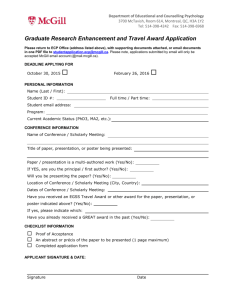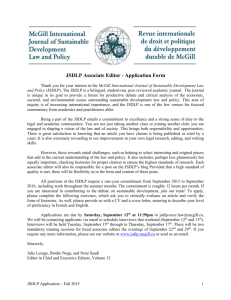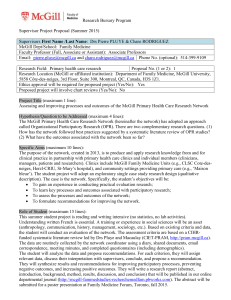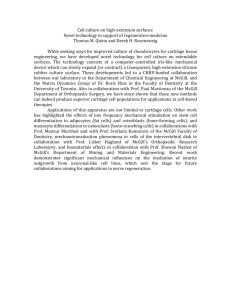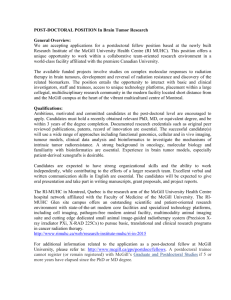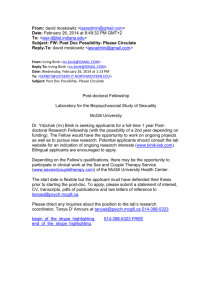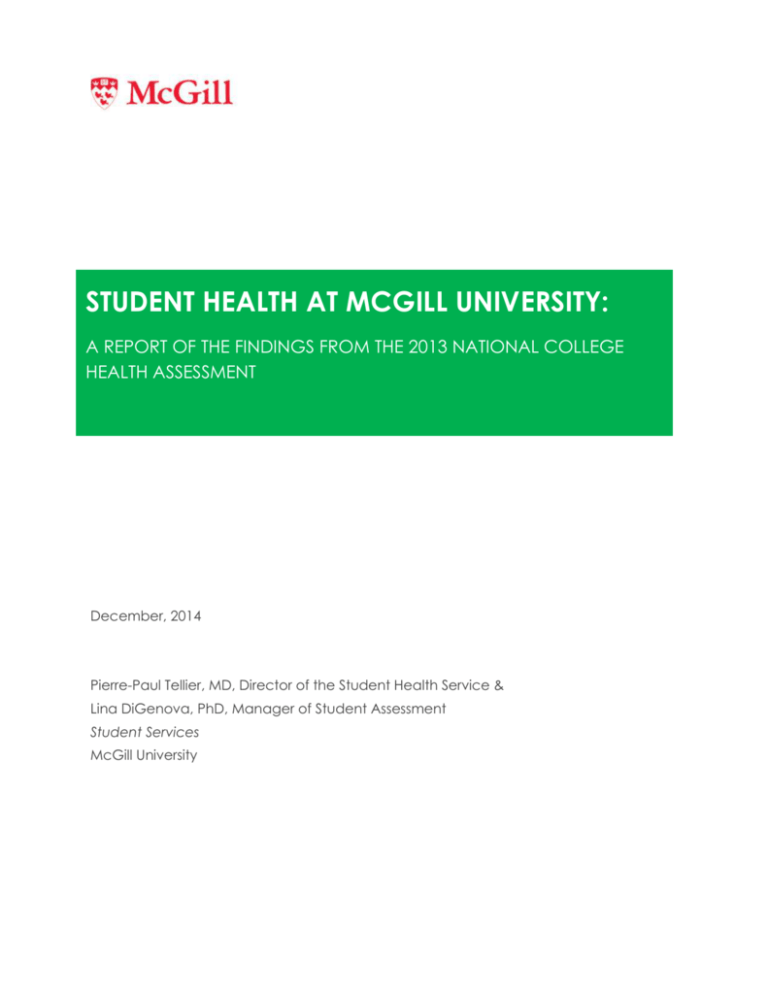
STUDENT HEALTH AT MCGILL UNIVERSITY:
A REPORT OF THE FINDINGS FROM THE 2013 NATIONAL COLLEGE
HEALTH ASSESSMENT
December, 2014
Pierre-Paul Tellier, MD, Director of the Student Health Service &
Lina DiGenova, PhD, Manager of Student Assessment
Student Services
McGill University
CONTENTS
Foreward ............................................................................................................................................................. 3
Introduction ....................................................................................................................................................... 4
Working Definition of Health and Wellbeing at McGill .............................................................................. 6
Goals .................................................................................................................................................................... 7
Methodology ..................................................................................................................................................... 7
Findings ................................................................................................................................................................ 7
Interpreting benchmark comparisons ...................................................................................................... 7
Demographics ............................................................................................................................................... 8
General health .................................................................................................................................................. 8
Disease and injury prevention .................................................................................................................. 10
Academic Impacts ......................................................................................................................................... 11
Violence, abusive relationships and personal safety ............................................................................... 14
Alcohol, tobacco, and other drug use....................................................................................................... 15
Alcohol and prescription drug use within last 12 months ............................................................... 18
Prescription drug use .............................................................................................................................. 18
Sexual Health ................................................................................................................................................... 19
STI Protection and Contraceptive Use .................................................................................................... 20
Nutrition and exercise..................................................................................................................................... 21
Mental health................................................................................................................................................... 22
Psychological Distress ................................................................................................................................. 22
Students Seeking Support for Mental Health ......................................................................................... 24
Help-seeking behavioral intentions: ........................................................................................................ 25
Sleep .................................................................................................................................................................. 25
Health, health education, and safety ........................................................................................................ 26
Next steps.......................................................................................................................................................... 28
Recommendations ..................................................................................................................................... 28
References........................................................................................................................................................ 30
CONTACT US..................................................................................................................................................... 31
Resources for McGill Students ....................................................................................................................... 31
Page 2 of 32
FOREWARD
For the first time in 2013, McGill and over 30 Canadian universities participated in one of the largest
Canadian health and wellbeing surveys of university students, the National College Health Assessment. I
am pleased to share the highlights of these findings with you in this report.
While attending university is often considered an exciting time in one’s life, it is also a time of
tremendous change that for many McGill students occurs during late adolescence and early adulthood.
Many important milestones such as, choosing a career, a life partner and developing lifelong health
habits, often occur during the time spent at university. In my 28 years as Director of the Student Health
Service, it has been a priority to not only offer medical care to help students deal with diseases of all
types, and also work with the McGill community to provide health education so that students can enjoy
the benefits of excellent long term health.
To date Student Health Service’s promotional endeavours have been guided by evidence in the health
care field literature, clinical practice, our own internal student surveys and the availability of external
funding for specific programming. In order to better support our students in a holistic way, we required
more information as a health check of our student population, as well as their health promotion needs
and desires to better guide our efforts. In 2013, the opportunity to participate in a Canadian dialogue
about university student health became available through this National College Health Association
(NCHA) health and wellness survey initiative. NCHA is a standardized instrument that has been used
extensively in United States of America and has been adapted for Canadian university students. This
survey allows us to assess not only how we are doing at McGill but also how we compare to the national
average.
The goal of this document is to summarize the key survey results and to generate discussions about how
the McGill community envisions the future directions of our healthy campuses, both downtown and the
Macdonald campus. We hope that you find this information useful and invite all members of the McGill
community join the discussion. My colleague, Lina Di Genova, and I are both available to discuss the
wealth of information from this national initiative. Furthermore, I would be please to cooperate with
anyone or group who may want to discuss health promotion ideas.
Dr. Pierre-Paul Tellier
Student Health Services
McGill University
Page 3 of 32
STUDENT HEALTH AT MCGILL UNIVERSITY:
SUMMARY OF RESULTS FROM THE 2013
NATIONAL COLLEGE HEALTH ASSESSMENT
General Health
26% Not getting enough sleep
62% very good / excellent
48% Meet weekly exercise
guidelines
60% eating >3 fruits & veggies/
day
75% Healthy weight
(BMI between 18.9 – 24.9)
Mental Health
1 in 5 diagnosed or treated within
the last year
Academic Impacts
Feeling Overwhelmed
Conditions experienced by most
students with >50% negative
impact : Stress , Anxiety, Sleep,
Depression
90% felt overwhelmed by all they
had to do within the last year
Personal Safety
Feeling safe on campus
-
93 % in the daytime
-
56% at night time
Experienced within the last 12
months:
Sexual Health
-
Emotionally abusive
intimate relationship 5%
-
Sexual touching without
consent 8%
Alcohol
56% of sexually active McGill
students used contraception
2 out of 3 students were sexually
active within last year
-
65% used a condom
-
20% used ineffective means
78% consumed within 30 days
36% did something they regretted
due to alcohol consumption
1.4% reported being treated for
an STI within last year
Page 4 of 32
INTRODUCTION
Students face several challenges while studying at university, such as paying for school, balancing social
pressures with academic demands, new roles and the need to develop new friendships. (1). This may
lead to risky behaviour such as multiple sexual partners potentially leading to unwanted pregnancy,
sexually transmitted infections and accompanying psychological distress. In fact, youth under 25 years
have the highest incidence of terminated pregnancies and of sexually transmitted infections as
demonstrated by various Public Health agencies across North America (2)(3)(4). This age group also has
high rates of alcohol use as well as other substances (5), (6). Mental health issues are also a concern
with high rates of anxiety, depression and suicide (7) (8).
In addition, several students arrive on campus with a variety of existing health issues that require care.
These can include chronic physical and mental health issues which require a different set of skills from
practitioners offering service to this population. To date at McGill we have gathered some of this
information through locally developed surveys designed to evaluate health promotion activities. These
surveys though valuable, do not provide comparative information.
There is a growing need to gather information on a regular basis which will allow us to monitor health
behaviour over time and also provide benchmark data comparing the health of our students to those in
other universities across North America. To this end, in the spring of 2013, McGill joined 31 other
Canadian universities in the National College Health Assessment II. This is an American, non-profit,
research effort organized by the American College Health Association. It was developed by an
interdisciplinary team of college health professionals in 1998-1999. It has been evaluated extensively
for reliability and validity. It was designed to collect local and national data about risk and protective
behaviors, perceived norms, and incidence and prevalence of a variety of health problems/conditions,
which may affect academic performance and retention (9). The NCHA is a 64-question survey and a
Canadian version is also available. The following content areas are covered in this assessment:
1)
2)
3)
4)
General health of university students
Disease and injury prevention
Academic impacts
Violence, abusive relationships and
personal safety
5)
6)
7)
8)
9)
Alcohol, tobacco, and other drug use
Sex behavior
Nutrition and exercise
Mental health
Sleep
The remainder of this report will be presented in the following sections:
Defining Health and Wellbeing at McGill
Findings
Goals
Conclusions
Methodology
Recommendations
Page 5 of 32
WORKING DEFINITION OF HEALTH AND WELLBEING AT MCGILL
The World Health Organization defines health as “a state of complete physical, mental and social wellbeing and not merely the absence of disease or infirmity”(10). McGill’s Student Services units are
committed to promoting student success and wellbeing. Our approach to student wellbeing is holistic,
culturally-sensitive and comprises the following aspects: academic, career, culture, emotional, financial,
physical, social and spiritual.
Chart 1: Aspects of wellbeing
Spiritual
Academic
Social
Career
Physical
Culture
Financial
Emotional
Building on the WHO health definition and applying it to Student Services’ holistic approach, our
working definition of health includes:
Feeling vital and full of energy
Having a sense of purpose in life
Experiencing connectedness to community
Being able to do things one enjoys
Having good social relationships
Experiencing a sense of control over one’s life and one’s living conditions (11).
Page 6 of 32
GOALS
In the winter 2013 academic term, this project was initiated by McGill’s Student Health Service and
carried out with the Student Assessment Office. With the support of the Executive Director, Services for
Students and the Office of the Deputy Provost, (Student Life and Learning)1, the survey was launched to
develop a better understanding of student health. This survey investigated risk and protective behaviors,
perceived norms, incidence and prevalence of a variety of health problems/conditions which may affect
academic performance and retention.
The overall goals of this initiative are to:
1) Develop a baseline with national benchmarks: This survey will enable us to monitor changes and
compare our findings to participating peer institutions.
2) Increase our understanding of students’ health habits, behaviors, and perceptions: The survey was
administered to a random sample of our general student body, not just the students who use our
services, providing us with the opportunity to gain insight from a broad cross-section of our student
population.
3) Stimulate community discussions: Disseminating and sharing the findings of this survey and use the
information to proactively support the collective wellbeing of our student body.
4) Use the evidence to design healthy campuses (downtown and Macdonald Campus): The data
collected from this survey will be used to provide data for campus committees, to prioritize and
build support programs that respond to evolving student needs and create wellbeing promotional
campaigns.
METHODOLOGY
In the winter 2013, a random sample of 4,000 undergraduate and graduate students (full-time or parttime; excluding Continuing Studies) was invited to participate in the online survey.
This research project was approved by the Medical Research Ethics Board and the Office of the Deputy
Provost, Student Life and Learning.
FINDINGS
A total of 354 students participated in the study, or a response rate of 10%.
INTERPRETING BENCHMARK COMPARISONS
Whenever possible throughout this report, McGill results are compared to the national average data. T-test
comparisons were conducted to assess whether McGill results are statistically different from the Canadian
benchmark data. Asterisks are used to indicate the following significance levels: * for p<.05; ** for p<.01; *** for
p<.001. Canadian comparisons were limited to an aggregate report. Only the McGill data are weighted by gender
and level of study.
1
Special thanks to McGill’s Planning and Institutional Analysis Office who provided the random sample for this project.
Page 7 of 32
DEMOGRAPHICS
The following table outlines the demographics of McGill and Canadian university respondents.
Table 1
McGill
Canadian
Average
21.1
21
3.1
22.9
21
5.9
57.5%
42.5%
0%
67.6%***
30.9%
0.2%
87.5%
90.9%
Gay/Lesbian
5.5%
2.5%
Bisexual
Unsure
4.5%
2.5%
4.2%
2.5%
Level of Study
1st year undergraduate
2nd year undergraduate
3rd year undergraduate
4th year undergraduate
26%
22%
25%
19%
21%*
20%
20%*
17%
Age
Average age
Median
Standard Deviation
Gender
Female
Male
Transgender
Sexual Orientation
Heterosexual
5th year or more
undergraduate
Graduate or professional
Other
2%
4%
1%
7%***
14%***
1%
International
Student
Ethnocultural Background
Aboriginal
White
Other ¥
Relationship Status
Not in a relationship
In a relationship but not
living together
In a relationship and living
together
Living Situation
Campus residence hall
Parent/guardian's home
Other off-campus housing
Other college/university
housing
Fraternity or sorority
house
Other
McGill
Canadian
Average
22%
11%***
0%
69.6%
30.4
3.3%**
70.1%
26.6
56%
33.7%
48.3%**
33.8%
10.3%
18%***
14%
38%
32%
12%
30%**
46%***
11%
0%
3%***
0%
5%
8%*
*p<.05; ** p<.01; ***p<.001
¥ Other refers to Statistics Canada 2006 Census question options about ethnocultural background: Arab, Black, Chinese, Filipino,
Japanese, Korean, Latin American, South Asian, Southeast Asian, West Asian and Multiracial
GENERAL HEALTH
A greater proportion of McGill students describe themselves as being in good health (very good or
excellent), (62%) in comparison to the Canadian average (53%). This difference is most likely due to
healthier life style habits, as McGill students also report eating more servings of fruits and vegetables,
exercising more, maintaining a healthy weight (see p.19) and higher rates of immunization (p10). McGill
students also report lower levels of financial distress (see p.20). These factors should be considered in
the interpretation of the data.
Overall, the distribution of common medical problems is consistent with the Canadian data, except
McGill students tend to report fewer diagnoses of STIs and back pain (Table 2).
Page 8 of 32
Chart 2: % of students who describe their general health as very good or excellent
Table 2: Diagnosed or treated by a professional for any of the following health problems within the last 12
months:
McGill
Illnesses Associated with
Stress
Canadian
Average
9%
11.9%
Migraine Headache
Irritable Bowel Syndrome
6%
3%
8.3%
3.6%
Infectious Diseases (Other
than STIs)
Sinus infection
Urinary tract infection
37%
10%
8%
35.3%
11.3%
10.6%
7%
6%
5%
0%
11%*
5.2%
6.6%
.3%
1%
0%
1%
0.3%
Strep throat
Bronchitis
Ear infection
Hepatitis B or C
Mononucleosis
Tuberculosis
McGill
Canadian
Average
STIs
1.4%
3.5%
Chlamydia
Gonorrhea
Genital herpes
Genital warts / HPV
HIV infection
Chronic Medical
Problems
Allergies
Back pain
Broken bone /
Fracture / Sprain
Asthma
High cholesterol
High blood pressure
Repetitive stress
injury
Diabetes
Endometriosis
.2%
0%
.2%
.8%
.2%
1.1%
.2%
.6%
1.2%
.2%
42%
12%
10%
54.3%
13.7%
16.9%***
8%
5%
2.2%
2%
7.7%
7.8%
1.4%
2.2%
2%
.2%
.2%
2.9%
.9%
.8%
*p<.05; ** p<.01; ***p<.001
Page 9 of 32
Chart 3 - Proportion of students who reported any of the following…
Psychiatric condition
ADHD
Partial sightedness / Blindness
Chronic illness
Other disability
Learning disability
Speech or language disorder
Mobility / Dexterity disability
Deafness / Hearing loss
0%
McGill
2%
4%
6%
8%
10%
Canadian Average
DISEASE AND INJURY P REVENTION
McGill students reported higher immunization rates that have been linked to better determinants of
health. However, with respect to injury prevention, McGill students reported significantly lower levels
of bicycle helmet use. Providing more health awareness as it pertains to accident prevention will be an
area of focus as bicycle related accidents are commonly seen in the Student Health clinic.
Table 3 - Students reported…
McGill
Canadian Average
75%
70%
51%
44%
36%
25%
71%
62%**
44%**
33%***
23%***
27%
29%
27%
30%
44%
42%***
28%
22%***
50%*
receiving the following vaccinations (shots) %:
Hepatitis B
Measles, mumps, rubella
Meningococcal meningitis
Varicella (chicken pox)
Human Papillomavirus/HPV (cervical cancer vaccine)
Influenza (shot or nasal mist)
Wore a helmet when riding a bicycle within the last 12 months¥
N/A, did not do this activity within the last 12 months
Never
Rarely or sometimes
Mostly or always
¥ Students responding "N/A, did not do this activity within the last 12 months" were excluded
*p<.05; ** p<.01; ***p<.001
Page 10 of 32
ACADEMIC IMPACTS
Participants were asked to report on how various factors affected their individual academic
performance within the last 12 months, as defined as receiving, a lower grade on an exam, or an
important project; a lower grade in the course; or receiving an incomplete or dropped the course.
Examining the areas that have the greatest impact on academic performance, McGill students voiced
stress, anxiety and sleep difficulties, along with the frequent physical manifestation of these conditions.
In addition 24% of McGill students reported internet use as a growing concern. While the proportion of
students who are affected by substance use is low in comparison to other factors, it is nonetheless a
concern that needs to be addressed on general health and wellbeing. The participation in
extracurricular activities has a greater reported impact on our students than on those in other Canadian
universities. This item needs to be further investigated as it could reflect poor time management skills
or a greater proportion of over achieving students in our population, both contributing to higher levels
of stress and anxiety.
Table 4
McGill
Canada
Mental Health and Emotional
Traumatic Experiences
McGill
Canada
Physical Conditions
Stress
42%
39%
Sleep difficulties
26%
27%
Anxiety
33%
28%*
4%
4%
Depression
14%
17%
Chronic health problem or
serious illness
Assault (sexual)
1.3%
0.8%
Chronic pain
3%
4%
Discrimination
1%
1%
Injury
2%
3%
Eating disorder/problem
1%
2%
Allergies
1%
2%
0.5%
0.6%
Pregnancy
0%
1%
Assault (physical)
Addictive Behaviours
Infectious Diseases
Internet use/computer games
24%
21%
Cold/Flu/Sore throat
23%
22%
Alcohol use
6%
5%
6%
6%
Drug use
3%
2%
Sinus infection/Ear
infection/Bronchitis/Strep
throat
Gambling
0%
0.3%
0.7%
0.4%
ADHD
4%
4%
Learning disability
3%
4%
Finance, Social & Relationships
STI
Learning
Extracurricular participation
17%
10%***
Concern for friend / family
17%
15%
Work
15%
17%
Relationship difficulties
15%
13%
Roommate difficulties
6%
6%
Finances
5%
9%
Death of a friend /family
4%
7%*
*p<.05; ** p<.01; ***p<.001
Page 11 of 32
The following scattergram chart presents the number of respondents experiencing a condition in
relation their respective reported academic impact. The percentage of McGill students experiencing
conditions are presented along the x axis, and the academic impact percentages are presented along the
y-axis.
Our Interpretation of the scattergram quadrants is that the conditions and their relative academic
impact can by summarized in the following three broad clusters:
-
Learning, physical and mental health: although experienced by less than 50% of respondents,
have a relatively high impact on academic performance
-
Addictive behaviours, social / relationships and infectious diseases: these conditions are
experienced by over 50% of the respondents with low to moderate impact (30% to 48%)
-
Mental health: experienced by more than 50% of respondents with the greatest impact on
academic performance (over 50%)
Page 12 of 32
Chart 4 - McGill: % Experiencing and Academic Impact
100
Learning, Physical and
Mental Health
Mental Health
90
80
% EXPERIENCING CONDITION WITH ACADEMIC IMPACT
Sleep difficulties
70
Learning disability
60
Depression
Anxiety
ADHD
Stress
50
Relationship
difficulties
Concern
for family /
friend
Work
STIs
40
Chronic health
problem
Sexual Assault
Sinus/Ear
Infections
Death- family
member/ friend
30
Drug Use
Cold/Flu/Sore throat
Extracurricular
participation
Chronic pain
Physical Assault
Finances
Injury
20
Internet use/computer games
Roommate difficulties
Discrimination
Eating disorder/problem
Homesickness
Alcohol
Use
10
Social / relationships and
Infectious diseases
Allergies
0
Pregnancy
Gambling
0
10
20
30
40
50
60
70
80
90
% EXPERIENCING CONDITION
Page 13 of 32
100
VIOLENCE, ABUSIVE RELATIONSHIPS AND PERSONAL SAFETY
Personal safety on Canadian campuses is highly valued. Violence and abusive occurrences are of great
concern. Although the number for personal safety on McGill campuses as presented in Table 5 is
relatively high, this number is lower for females compared to males.
Based on the findings in this study, as well as other recent McGill surveys, the number of reported
violent incidents is low, nonetheless victims of such occurrences are often severely affected emotionally.
As reported in the literature, males are more frequently involved in physical altercation than females
and conversely for sexual assault. One in ten females in this study reported being touch sexually
without their consent, while not significantly different than the national average it is nonetheless higher
and of concern.
Table 5
Within the last 12 months, students reporting
experiencing (%):
A physical fight
A physical assault (not sexual assault)
A verbal threat
Sexual touching without their consent
Sexual penetration attempt without their consent
Sexual penetration without their consent
Stalking
An emotionally abusive intimate relationship
A physically abusive intimate relationship
A sexually abusive intimate relationship
Students reported feeling very safe:
On campus (daytime)
On campus (nighttime)
In the community surrounding school (daytime)
In the community surrounding school (nighttime)
Male
McGill
Female
Total
Canadian Average
Male
Female
Total
5.3%
4.0%
22%
2.0%
0.7%
0.0%
0.0%
4.7%
1.3%
0.7%
2.0%
2.0%
13.7%
12.7%
3.4%
1.5%
7.8%
5.9%
1.0%
2.0%
3.4%
2.7%
17.2%
8.4%
2.1%
0.8%
4.7%
5.4%
1.2%
1.4%
9.9%
5.3%
25.2%
3.4%
0.8%
0.5%
3.3%
7.2%
1.8%
1.0%
3.6%
3.5%
17.9%
8.5%
3.0%
1.5%
7.0%
11.0%
1.9%
2.0%
5.6%
4.1%
20.1%
6.9%
2.3%
1.2%
5.8%
9.8%**
1.9%
1.7%
96.7%
72%
82%
25%
90.2%
40.2%
66.7%
31%
92.7%
54%
73.3%
28%
92.1%
60.7%
73.7%
39%
87.4%
24.8%
62.2%
13%
88.8%*
36.1%***
65.7%**
21%**
*p<.05; ** p<.01; ***p<.001
Page 14 of 32
ALCOHOL, TOBACCO, AND OTHER DRUG USE
Alcohol is the most commonly used substance by McGill students, followed by marijuana and only 2.5%
reported cigarette use. The findings are comparable to what is found in population based studies for the
18-24 age group both in Canada and the USA. The findings reveal that a respondent’s actual personal
use is significantly lower than their perceived use of peer consumption. The findings can be used to
inform students of the actual consumption rates as well as to inform personal choices. As on other
Canadian campuses, alcohol use and misuse is of concern because of its association with risky behaviors
and potentially negative consequences, such as, forgetting ones whereabouts, having unprotected sex,
STIs, unwanted pregnancy, physical trauma and legal action. These are more likely to occur when binge
drinking is involved. The definition of binge drinking is consuming more than three drinks in one sitting
for a female and more than five for males. Approximately 40% of McGill students reported drinking five
or more drinks in one sitting during a two week period (Chart 7).
Also of concern is the 3-7% of students who misuse prescription drugs that were not prescribed to them,
including, antidepressants, stimulants and pain killers (Chart 9).
Table 6- Personal use versus perceptions of typical student use
McGill
Actual Use
Perceived Use
Canadian Average
Actual Use
Perceived Use
Alcohol
Never used
10.6%
1.0%
16.4% **
2.9%*
Used, but not in the last 30 days
11.9%
1.0%
12.8%
1.4%
Any use within the last 30 days
Cigarette
Never used
77.5%
98%
70.8%**
95.6%*
67.0%
4.8%
70.8%
7.0%
Used, but not in the last 30 days
17.0%
10.4%
17.6%
13.3%
Any use within the last 30 days
Marijuana
16.0%
84.8%
11.6%***
79.7%*
Never used
51.7%
3.6%
60.1%**
7.2%*
Used, but not in the last 30 days
23.3%
7.3%
23.8%
9.0%
Any use within the last 30 days
All other drugs combined *
Never used
25.0%
89.1%
16.0%***
83.8%**
63%
9%
67.3%
9.3%
Used, but not in the last 30 days
26%
25%
22.0%
18.1%**
Any use within the last 30 days
11%
66%
10.7%
72.5%**
*p<.05; ** p<.01; ***p<.001
Page 15 of 32
Chart 5 -McGill - Personal use vs perceived peer use within 30 days
98%
89%
85%
78%
66%
25%
11%
3%
Alcohol
Marijuana
Actual
Cigarettes
Other drugs
Perceived
Chart 6- Canada - Personal use vs perceived peer use within 30 days
95%
84%
80%
73%
71%
16%
Alcohol
11%
Marijuana
Actual
Cigarettes
11%
Other drugs
Perceived
Page 16 of 32
Chart 7: Alcohol Consumption
% Alcohol use within last 30 days
# of drinks consumed the last time students
“partied” or “socialized”
78%
71%
McGill
McGill
Canada
Mean
4.7
5.4
Standard Deviation
3.3
4.2
Canada
# of times consumed 5 or more drinks in a sitting
within the last two weeks
McGill
Blood Alcohol Level
Canada
N/A Don’t drink
13%
18%
None
49%
47%
1-2 times
25%
27%
3-5 times
11%
8%
6 or more times
2.3%
1.2%
<.10
<.08
0%
20%
40%
McGill
60%
80%
100%
Canada
Drinking and Driving Behaviors
Table 6 - % of students reported driving after having …
McGill
Canadian
Average
5 or more drinks in the last 30 days
1.1%
1.1%
any alcohol in the last 30 days
11.2%
19.4%***
*p<.05; ** p<.01; ***p<.001
Page 17 of 32
ALCOHOL AND PRESCRIPTION DRUG US E WITHIN LAST 12 MONTH S
Chart 8: % of students who drank alcohol reported experiencing the following in the last 12 months when
drinking alcohol
Reported one or more in list below
Did something you later regretted
Forgot where you were or what you did
Had unprotected sex
Physically injured yourself
Got in trouble with the police
Someone had sex with me without my consent
Seriously considered suicide
Physically injured another person
Had sex with someone without their consent
0%
McGill
10%
20%
30%
40%
50%
60%
70%
Canadian Average
PRESCRIPTION DRUG USE
Chart 9: % of students who reported using prescription drugs that were not prescribed to them within the last
12 months
100%
90%
80%
70%
60%
50%
40%
30%
20%
10%
3%
6%
3%
6%
7%
4%
0%
Antidepressants
Pain killers
McGill
Stimulants
Canadian Average
Page 18 of 32
SEXUAL HEALTH
Over two-thirds of respondents reported having one or more sexual partners within the last year. While
serial monogamy is not an unusual finding in this age group, it none the less indicates a potential risk if
adequate protection is not used. Of the sexually active respondents, approximately 45% reported
engaging in oral or vaginal intercourse, and 5% in anal sex.
Table 7 - Students reported having:
McGIll
Canadian
Average
44.9%
45.1%
30%
29.3%
25.1%
25.7%
Yes¥
46.0%
49.5%
No, have never done this sexual activity
35.0%
31.2%
No, have done this sexual activity but not in the last 30 days
19.1%
19.3%
Oral sex within the past 30 days
Yes¥
No, have never done this sexual activity
No, have done this sexual activity but not in the last 30 days
Vaginal sex within the past 30 days
Anal sex within the past 30 days
Yes¥
4.2%
4.9%
No, have never done this sexual activity
80.2%
75.7%
No, have done this sexual activity but not in the last 30 days
15.9%
19.4%
¥Students responding "Never did this sexual activity" or " Have not done this during the last 30 days" were excluded from the
analysis; McGill students responding yes to the following: Oral sex, n = 157; vaginal intercourse, n = 159; anal sex, n = 14
*p<.05; ** p<.01; ***p<.001
Page 19 of 32
STI PROTECTION AND CONTRACEPTIVE USE
Table 8 summarizes the percentage of sexually active students who use protective barriers for STI
protection and their contraceptive practices. Only slightly more than half of the McGill respondents use
condoms for vaginal intercourse and nearly 40% do not use them for anal intercourse. The 18-24 age
group has the highest incidence of chlamydia and gonorrhea two diseases which are condom
preventable, often asymptomatic and when not treated can have major consequences especially for
females. The 40% who do not use condoms for anal intercourse is very concerning in view of the rising
incidence of HIV infections in men who have sex with men of this age group. The contraception figures
are consistent with previous studies. However, it also demonstrates that 20% use withdrawal as a
contraceptive method and a further 6% use fertility awareness. In this age group both of these methods
are unreliable. These numbers speak to the need of continued education pertaining to safer sex.
Table 8
McGill
Canadian
3%
4.6%
Vaginal intercourse
54.3%
50.3%
Anal intercourse
Contraceptive use reported by students or their partner the last time they had
vaginal intercourse:
Yes, used a method of contraception
38.7%
31.7%**
56%
57.9%
44%
42.1%
70%
65%
18.4%
5.8%
5.3%
2.1%
2.1%
0.5%
0.5%
0.5%
0.5%
0.5%
0.5%
64.3%*
61.1%
27%***
6.3%
7.2%
4.0%
2.6%
1.6%
0.6%
1.6%
0.6%
0.3%
0.3%
43%
12%
1%
46.2%
13.3%
1.5%
Using a condom or other protective barrier within the last 30 days (mostly or
always) Sexually active students reported¥
Oral sex
Not applicable / Didn't use a method /
Don't know
If YES to contraceptive use the last time student had vaginal intercourse, reported
means of birth control used among college students or their partner to prevent
pregnancy
Birth control pills (monthly or extended cycle)
Male condom
Withdrawal
Fertility awareness (Calendar, mucous, basal body temperature)
Intrauterine device
Vaginal ring
Spermicide (foam, jelly, cream)
Birth control shots
Birth control implants
Birth control patch
Female condom
Diaphragm or cervical cap
Contraceptive sponge
Male condom use plus another method
Used (or partner used) emergency contraception within the last 12 months
Unintentional pregnancy or got someone pregnant within the last 12 months
*p<.05; ** p<.01; ***p<.001
Page 20 of 32
NUTRITION AND EXERCISE
Overall 60% of McGill students reported eating 3 or more servings of fruit and vegetables and 48% met
physical fitness guidelines in a 7 day period. Table 9 also shows that 74% of respondents are at a healthy
weight. This finding is higher than the Canadian average.
Chart 10:
McGill
5 or more
per day ,
15%
0 servings
per day,
2%
5 or more
per day ,
13%
Canada
0 servings
per day,
3%
1-2 per
day, 38%
1-2 per
day, 45%
3-4 per
day, 38%
3-4 per
day, 45%
Table 9 – Student Exercise and Body Mass Index Comparisons
McGill
Canadian
23.3%
23.5%
moderate-intensity cardio or aerobic exercise for at least 30 minutes
0 days
1-4 days
54%
58.2%
5-7 days
vigorous-intensity cardio or aerobic exercise for at least 20 minutes
0 days
23%
18.4%*
40%
41.8%
1-4 days
52%
48.9%
5-7 days
Students reported meeting the recommendations for moderate-intensity
exercise, vigorous-intensity exercise, or a combination of the two (2
moderate-intensity exercise periods = 1 vigorous-intensity exercise period).
Guidelines met
8%
8.2%
48.1%
44.6%
<18.5 Underweight
8%
7.4%
18.5 - 24.9 Healthy Weight
74%
63.4%***
25-29.9 Overweight
14%
20.0%**
30 - 34.9 Class I Obesity
3%
6.1%*
35 - 39.9 Class II Obesity
0.3%
2.0%
More than 40 Class III Obesity
0.3%
1.1%
Mean
22.30
23.64
Median
21.80
22.68
Std Dev
3.42
4.87
Body Mass Index
*p<.05; ** p<.01; ***p<.001
Page 21 of 32
MENTAL HEALTH
Student psychological wellbeing is a growing concern on Canadian university campuses. Over 60 % of
respondents reported experiencing more than average stress and approximately 90% felt overwhelmed
by what they had to do or felt tired for reasons other physical than causes. Over 50% of respondents
also reported feelings of sadness, loneliness, hopelessness and overwhelming anxiety. Over 30%
reported feeling too depressed to function and overwhelming anger. Suicidal thoughts were reported by
7% of respondents, 5% intentional personal injury and 0.3% attempted suicide (Table 10).
The issues that McGill respondents found most traumatic or difficult to handle in the last 12 months
were academics, career-related issues and intimate relationships and 66% had two or more reasons to
feel distressed (Table 11), with fewer reporting financial concerns than the Canadian average.
PSYCHOLOGICAL DISTRE SS
Chart 11 - Within the last 12 months, how would you rate the overall level of stress experienced?
50%
40%
30%
20%
10%
0%
No stress
Less than average
stress
McGill
Average stress
More than
average stress
Tremendous stress
Canadian Reference
Table 10 - Students reported experiencing the following within the last 12 months:
McGill
Canadian Reference
Felt overwhelmed by all you had to do
89%
89%
Felt exhausted (not from physical activity)
88%
87%
Felt very sad
67%
69%
Felt very lonely
66%
64%
Felt things were hopeless
56%
54%
Felt overwhelming anxiety
53%
57%
Felt so depressed that it was difficult to function
38%
37%
Felt overwhelming anger
35%
42%**
Seriously considered suicide
7%
9%
Intentionally cut, burned, bruised, or otherwise injured yourself
5%
7%
0.3%
1.3%
Attempted suicide
*p<.05; ** p<.01; ***p<.001
Page 22 of 32
Table 11 - Within the last 12 months, any of the following been traumatic or very difficult to handle:
McGill
Canadian Reference
Academics
56%
56%
Career-related issue
30%
31%
Intimate relationships
30%
32%
Sleep difficulties
26%
32%*
Family problems
23%
30%**
Finances
23%
37%***
Other social relationships
20%
26%*
Personal appearance
19%
27%**
Personal health issue
17%
22%*
Health problem of family member or partner
14%
21%**
Death of family member or friend
11%
16%**
Other
10%
12%
Students reporting none of the above
25%
19.3%
Students reporting only one of the above
14%
11.9%
Students reporting 2 of the above
14%
13.3%
Students reporting 3 or more of the above
52%
55.6%
Page 23 of 32
STUDENTS SEEKING SUP PORT FOR MENTAL HEALTH
One in three McGill respondents reported receiving support for mental health concerns, with over 21%
at a McGill service (Chart 12 – including the following McGill Services: Counselling Service, Student
Health Service and Mental Health Service). Within the last year, 10% or respondents sought support for
depression and anxiety (Table 12).
Chart 12: % of Students who received psychological or mental health services:
40%
35%
35%
McGill
33%
Canadian Reference
30%
25%
21%*
20%
18%
16%
15%
15%
12%
10%
10%
5%
5%
5%
0%
Counselor/Psychologist
From university's
Counseling or Health
Service
Psychiatrist
Other medical provider
(e.g., physician, nurse
practitioner)
Clergy
Table 12- Within the last 12 months, diagnosed or treated by a professional for the following:
McGill
Canadian Reference
Anxiety
10%
12%
Depression
10%
10%
Panic attacks
6%
6%
Attention Deficit and Hyperactivity Disorder
4%
3%
Insomnia
4%
4%
Other mental health condition
3%
3%
Other Sleep Disorder
2%
2%
Obsessive Compulsive Disorder
2%
2%
Bipolar Disorder
1%
1%
Bulimia
1%
1%
Phobia
1%
1%
Anorexia
1%
1%
Substance abuse or addiction
0.8%
0.8%
Other addiction
0.3%
0.4%
Schizophrenia
0.2%
0.2%
Page 24 of 32
HELP-SEEKING BEHAVIORAL I NTENTIONS:
SLEEP
As seen above, 26% of respondents reported that lack of sleep adversely impacted academic
performance. A closer look at sleep patterns showed that over 44% of McGill respondents indicated
problems with sleepiness during daytime activities. The finding is consistent with the Canadian
average (Chart 13). While McGill respondents indicated that they felt rested most of the time in the
morning, over 60% often felt tired or sleepy or dragged out on 3 or more days in the last week.
Chart13: Reported problem with sleepiness during daytime
activities within past 7 days:
50%
40%
30%
20%
10%
0%
No problem
A little problem
More than a
problem
McGill
A big problem
A very big problem
Canada
Table 13 - Over a 7 day period…
0 days
1-2 days
3-5 days
6+ days
Getting enough sleep to feel rested in the
morning:
Canadian
McGill
Average
9.9%
10.9%
27.7%
29.7%
47.7%
47.6%
15.3%
11.8%*
How often felt tired, dragged out, or
sleepy during the day:
McGill
6.6%
33.6%
41.5%
18.3%
Canadian Average
7.5%
30.4%
43.3%
18.8%
*p<.05; ** p<.01; ***p<.001
Page 25 of 32
HEALTH, HEALTH EDUCATION, AND SAFETY
Over half of McGill students reported receiving information about a variety of topics, such as, stress
reduction, sexual assault / violence prevention, physical activity, etc. (Table 14). On average, McGill
respondents reported receiving more health-related information from the University than other
Canadian universities. However, disease, injury and violence prevention were reported by less than 50%
of respondents. Although this is consistent with other health education programs across the country,
programming adaptations are planned in light of the data above related to sleep and mental health
concerns.
Table 14 - Health information received from students’ university
Stress reduction
Sexual assault / Relationship violent prevention
STI prevention
Alcohol and other drug use
Depression / anxiety
Physical activity
Nutrition
Pregnancy prevention
Eating disorders
Cold / flu / sore throat
Suicide prevention
How to help others in distress
Injury and violence prevention
Violence prevention
Grief and loss
Relationship difficulties
Sleep difficulties
Tobacco use
Problem use of internet / computer games
McGill
64.5%
63.6%
61.5%
55.8%
55%
51.2%
48.5%
45%
34.5%
33.6%
27.6%
25.6%
25.5%
24.7%
21.4%
18%
17.9%
13.9%
8.7%
Canadian
Average
59.6%*
47.7%***
46.9%***
46.7%***
52.6%
54.5%
45.9%
35.4%**
24.7%**
40.3%**
25.3%
24.8%
23.1%
23.8%
21.2%
22.7%
23.1%**
24.7%***
13.4%*
Page 26 of 32
In addition, respondents were also invited to express interest in receiving information from their
university about health related topics. Over 75% of McGill respondents reported wanting information
about stress reduction and how to help others in distress. Over two-thirds also expressed interest in
learning more about sleep, nutrition, physical activity and depression and over half about STI, sexual
assault/ relationship violence and suicide prevention.
Table 15 - Interest in receiving information on the following topics from students’ university
Stress reduction
How to help others in distress
Sleep difficulties
Nutrition
Physical activity
Depression / anxiety
STI prevention
Sexual assault / Relationship violent prevention
Suicide prevention
Grief and loss
Violence prevention
Injury and violence prevention
Relationship difficulties
Eating disorders
Cold / flu / sore throat
Pregnancy prevention
Alcohol and other drug use
Problem use of internet / computer games
Tobacco use
McGill
Canadian Average
79%
75%
69.4%
67.3%
62.3%
67.2%
55%
53.3%
51.5%
46.8%
46%
44.9%
43.7%
42.7%
42.6%
38.8%
37.3%
32.8%
23.3%
74.1%*
62.7%**
64.5%
67%
64.1%
62.9%
44.6%**
45.8%*
42.9%**
45%
39.7%*
39.6%*
45%
35.8%**
43%
33.4%*
35.7%
28.1%*
23.9%
Page 27 of 32
NEXT STEPS
One of the goals so Student Health Service is to provide health promotion and education to our
community. Based on the current literature and trends in epidemiology, top issues to address for your
adults are related to sexuality, common acute illnesses, chronic medical issues such as obesity,
substance use and mental health issues.
The NCHA survey has informed us about the areas where we can provide more health-related
information, such as, sleep, relationship difficulties and grief and loss.
The data from this survey will now be used to:
a) inform the planning of health promotion both in the short and long term,
b) serve as a benchmark to assess if we meet our health promotion target, and
c) serve as an education tool in providing us with perceived normative behaviour that can be
used to educate students.
RECOMMENDATIONS
Below are our recommendation for health promotion endeavours for:
Existing programs:
1) Continue and expand the existing health education and promotion program to maintain the
existing healthy habits and improve those that are lacking.
2) Reformat previously developed self-care information on acute infectious diseases and chronic
medical conditions and to present it in a more interesting manner.
3) Maintain an already successful sexual health education program focussing on decreasing the use
of unreliable contraceptive methods by couples and increasing condom use to decrease
transmission of STIs especially during anal sexual intercourse.
4) Develop evidence-based and relevant educational material using content experts as writers and
editors, student users as reviewers and presented in utilizing a variety of educational modalities.
Enhancing existing collaborations:
1) Address topics that have been identified in this study as having an important impact on student
performance such as addiction to electronic media, time management, sleep difficulties and
stress. This should be done in conjunction with other McGill units.
Page 28 of 32
2) Support Counselling Services and Mental Health Services, the content experts related to mental
health issues, to improve the ability of students to manage the various symptoms of anxiety and
depression, especially sleep related problems.
3) Collaborate on endeavours that will decrease violence of all kinds on our campus including
physical, sexual and emotional aggression, intimate partner violence and verbal abuse.
4) Apply principles of norm theory to highlight the differences in substance use vs perceived use of
on campus. Norm theory principles have been shown to help prevent substance misuse and the
resulting negative consequences to both physical and mental health for our students.
Health
1) Promote preventive health by encouraging vaccination of students against infectious diseases
and use of safety equipment during physical activity such as cycling.
2) Increase the number of students who are meeting the Canadian nutrition and exercise
guidelines and maintaining a healthy weight.
Page 29 of 32
REFERENCES
1 – White HR. Reduction of alcohol-related Harm on United States college campuses: The use of
personal feedback intervention. International Journal of Drug Policy, vol 17, 2006, 310-319
2 – Agence de la santé et des services sociaux de Montréal. Tableaux cumulatif des maladies
infectieuses à déclaration obligatoire (MADO), nombres de cas par groupes d’âge et sexe - Montréal
(région 06) - Semaines 21 à 24 (20 mai 2012 au 16 juin 2012). http://emis.santemontreal.qc.ca/santedes-montrealais/maladies-a-declaration-obligatoire/mado-statistiques/ Accessed July 21, 2012.
3 – Statistics Canada. Pregnancy Outcomes 2005. http://www.statcan.gc.ca/pub/82-224-x/82-224x2005000-eng.htm. Accessed July 21, 2012.
4 – National Center for HIV/AIDS, Viral Hepatitis, STD and TB Prevention – Division of STD Prevention.
Sexually Transmitted Diseases – Surveillance 2010. http://www.cdc.gov/std/stats10/surv2010.pdf.
Accessed July 22, 2012
5 – Arnett JJ. The development context of substance use in emerging adulthood. Journal of Drug Issues,
Vol 35, 235-254.
6 – Adlaf, EM, Demers, A, Gliksman, L. (Eds) Canadian Campus Survey 2004. Toronto, Canadian Centre
for Addiction and Mental Health, 2005
7 – American College Health Association – National College Health Assessment II. Spring 2010 Reference
Group Executive Summary. American College Health Association 2010. http://www.achancha.org/docs/ACHA-NCHA-II_ReferenceGroup_ExecutiveSummary_Spring2010.pdf. Accessed July 22,
2012
8 – Statistics Canada. Suicide and suicide rates by age group. (2005-2010)
http://www.statcan.gc.ca/tables-tableaux/sum-som/l01/cst01/hlth66a-eng.htm . Accessed July 22, 2012
9- American College Health Association – National College Health Assessment Spring 2007 Reference
Group Data Report (abridged) Journal of American College Health, 56, 5, 469-480
10-Preamble to the Constitution of the World Health Organization as adopted by the International
Health Conference, New York, 19-22 June, 1946; signed on 22 July 1946 by the representatives of 61
States (Official Records of the World Health Organization, no. 2, p. 100) and entered into force on 7 April
1948.
11-Laverick, G. (2004). Health Promotion Practice: Power and Empowerment. Sage Publications.
mental health negatively impact academic success.
Page 30 of 32
CONTACT US
Dr. Pierre-Paul Tellier, E: pierre-paul.tellier@mcgill.ca
Dr. Lina Di Genova, T: (514) 398-7072 / E: lina.digenova@mcgill.ca
Please cite as follows: Tellier, P., & DiGenova, L. (2014). Student health at McGill University: A
report of the findings from the 2013 National College Health Assessment. Montreal: Student
Services, McGill University
RESOURCES FOR MCGILL STUDENTS
Resources for Students
Student Services
Helping Students in Difficulty
Security Services
Student Health Service
Counselling Service
http://www.mcgill.ca/deanofs
tudents/helpingstudents
Downtown: 514-3983000
William and Mary Brown Building
3600 McTavish Street West
Montreal, Quebec H3A 0G3
Tel: 514-398-6017
Brown Student Services
Building,
3600 McTavish Street, Suite
4200
Montreal, Quebec
Macdonald: 514-3987777
http://www.mcgill.ca/se
curity/
http://www.mcgill.ca/studenthealt
h/
H3A 1Y2
Tel.: 514-398-3601
Student Life and Learning
Deputy Provost (Student Life
& Learning)
James Administration Building
Room 621
845 Sherbrooke Street West
Montreal, Quebec H3A 0G4
Tel.: 514-398-3109
http://www.mcgill.ca/studentli
feandlearning/
http://www.mcgill.ca/counselling/
http://www.mcgill.ca/wellness
Office of the Ombudsperson
3610 McTavish Street Suite 14
(Main Floor)
Tel.: 514-398-7059
Fax: 514-398-1946
Resources and Services
for Students
http://www.mcgill.ca/stu
dents/
Mental Health
Office for Students with
Disabilities / my access
Email:
ombudsperson@mcgill.ca
Brown Student Services Building
3600 McTavish, Suite 5500
Montreal, Quebec
H3A 0G3
Tel.: 514-398-6019
mentalhealth.stuserv@mcgill.ca
http://www.mcgill.ca/ombuds
person/
http://www.mcgill.ca/mentalhealt
h/
disabilities.students@mcgill.ca
McGill Office for Religious and
Spiritual Life
First Peoples' House
3505 Peel Street
Montreal, Quebec
H3A 1W7
Academic Advising
Service Point
http://www.mcgill.ca/student
s/advising/
3415 McTavish St.
Montreal, Quebec
Academic Advising Directory:
http://www.mcgill.ca/student
s/advising/advisordirectory
H3A 0C8 Canada
Tel: 514-398-7878
http://www.mcgill.ca/stu
dents/servicepoint/
Suite 4400, Brown Building
3600 rue McTavish
Montreal, QC, H3A 0G3
3415 McTavish St. McLennan
Library Building
Montreal, QC
H3A 0C8
Tel.: 514-398-6555
welcome@mcgill.ca
http://www.mcgill.ca/underg
raduateadmissions/introducingmcgill/visit-mcgill
Student Affairs Office
(faculty specific)
http://www.mcgill.ca/st
udents/advising/advisor
directory
http://www.mcgill.ca/osd/
Tel.: 514-398-3217
morsl@mcgill.ca
Tel: 514-398-4104
http://www.mcgill.ca/morsl/
Welcome Centre
Redpath Library Building, Suite
RS56
3459 McTavish Street
Montreal, Quebec
H3A 0C9
firstpeopleshouse@mcgill.ca
http://www.mcgill.ca/fph/
International Student Services
Campus Life and Engagement
Brown Student Services Building
3600 McTavish Street, Suite 4400
Montreal, Quebec H3A 0G3
Tel.: 514-398-4349
William & Mary Brown Student
Services Building, 3600
McTavish Street, Suite 3100
Montreal, Quebec H3A 0G3
Tel: 514-398-6913
Fax: 514-398-6944
firstyear@mcgill.ca
international.students@mcgill.ca
http://www.mcgill.ca/international
students/
Office of the Dean of Students
William Mary Brown Student
Services Building
3600 McTavish, Suite 4100
Montreal, Quebec H3A 0G3
Tel.: 514.398.4990
http://www.mcgill.ca/deanofst
udents/
Office of the Executive
Director, Services for Students
Brown Student Services
3600 McTavish, Suite 4100
Montreal, Quebec H3A 0G3
student.services@mcgill.ca
Tel.: 514-398-8238 / Fax: 514398-3857
http://www.mcgill.ca/students
ervices/
Athletics and Recreation
475 Pine Ave. West
Montreal, Quebec H2W 1S4
Tel: 514-398-7000
http://www.mcgillathletics.ca
http://www.mcgill.ca/firstyear/
Page 31 of 32
Off-Campus Housing
University Hall
3473 University Street
Montreal, Quebec H3A 2A8
housing.residences@mcgill.ca
Tel: 514-398-6368
http://www.mcgill.ca/student
s/housing/offcampus
Social Equity and
Diversity Education
(SEDE)
3610 McTavish, Suite 12
Montreal, QC
Canada H3A 1Y2
Tel: 514-398-5645
Email:
equity.diversity@mcgill.c
a
Career Planning Service
Scholarships and Student Aid
Enrolment Services
Brown Student Services Building
3600 McTavish St., Suite 2200
Montreal, Quebec H3A 0G3
Tel.: 514-398-3304
Brown Student Services
3600 McTavish Street
Suite 3200
Montreal, Quebec
Canada H3A 0G3
Tel.: 514-398-6013
3415 McTavish St., McLennan
Library Building
Montreal, Quebec H3A 0C8
careers.caps@mcgill.ca
http://www.mcgill.ca/caps/
http://ssmu.mcgill.ca/
3600 rue McTavish, Suite 1200
Montreal, QC H3A 0G3
P: (514) 398-6800
frontctr@ssmu.mcgill.ca
Post-Graduate Students’
Society of McGill
University
http://www.mcgill.ca/studentai
d/
Student Involvement &
Assessment
3650 McTavish
Brown Student Services Building,
3600
Montreal, Quebec, H3A
1Y2
McTavish, Suite 4100
Montreal, Quebec H3A 0G3
Tel.: (514) 398-3756
Tel: 514-398-7072
myinvolvement@mcgill.ca
https://pgss.mcgill.ca/en/
about
scholarships@mcgill.ca
student.aid@mcgill.ca
http://www.mcgill.ca/equ
ity_diversity/
Students’ Society of McGill
University
http://www.mcgill.ca/es/
feedback.stuserv@mcgill.ca
Tutorial Service
Housing and Hospitality
Suite 4200, Brown Student
Services,
University Hall
3473 University Street
Montreal, Quebec H3A 2A8
housing.residences@mcgill.ca
514-398-6368
3600 McTavish Street
Montreal, Quebec H3A 0G3
Tel.: 514-398-5816
Fax: 514-398-8149
tutoring.service@mcgill.ca
http://www.mcgill.ca/students
/housing/
http://www.mcgill.ca/tutoring/
http://www.mcgill.ca/involvement
Sexual Assault Center of the
McGill Students Society
Legal Information Clinic
at McGill
Shatner Bldg. Basement
University Centre
3480 McTavish, B-27
3480 McTavish St.
Montreal, QC, H3A OE7
Montreal, QC H3A 1X9
(514) 398-8500
main@sacomss.org
http://sacomss.org/
514-398-6792 (Legal
Information Clinic)
Macdonald Campus Student Service Centre
Centennial Centre, Suite CC1-124
21,111 Lakeshore Road
Ste-Anne-de-Bellevue, Québec
H9X 3V9
Tel: 514-398-7992
Email: stuserv.macdonald@mcgill.ca
http://www.mcgill.ca/macdonald-studentservices/contact-us
Teaching and Learning
Services
McLennan Library Building
3415 McTavish Street Suite
MS-12
Montreal, Quebec H3A 0C8
Tel.: 514-398-6648
Email: tls@mcgill.ca
Tel: 514-398-4384
(Student Advocacy)
http://licm.mcgill.ca/site.
php?lang=en&page=legal
clinic
Page 32 of 32

